This article has links to products and services we love, which we may make commission from.
Is Cuba safe to travel? Yes, it is actually one of the safest countries in the world when measuring crime figures. However, years of financial oppression has resulted in the creation of crafty ways of making money, some aimed at tourists. While you may experience some of the following Cuba scams, they will be delivered with charm and while it can get annoying, just remember your position of privilege which allows you to visit Cuba. Let’s find out about the popular scams in Cuba so you can be cautious of them during your trip. Note: All of these scams happened to us or tourists we met during our vacation. We’re happy to talk and here to learn, please leave us a comment below.
» You make also like | First timer’s guide to Cuba travel
Cuba Travel Safety: Avoid These Scams in Cuba
I rarely say that tourists need to buy travel guides but Cuba is definitely a country you would benefit from having one. Check out the options below.
1. Fake Cigars in Cuba
One of the most popular souvenirs to take home Cuba has to be cigars.
However, not all cigars are created equally and fake cigars with no duty paid will be confiscated at customs.
Be wary of buying them on the street as the sealed box may contain banana leaves.
For the authentic cigars, buy from plantations or shops.
There is even a great difference in price between authentic Cuban cigars.
If you are budgeting, the finest Cuban cigars were cheaper (three times!) in the official shop in Viñales compared the official shop in Havana.
Viñales is a beautiful, lush town close to Havana. I highly recommend you spend at least a day there during your time in Cuba.
2. When Did You Arrive, Sir?
If you answer “today” expect the response to be along the lines of…
What a great day to arrive, it’s the national day of – whatever black market goods/service is being sold – at an overinflated price.
How To Avoid This Scam
Smile, give pleasantries and move on but don’t be afraid to ask if you need help with directions, finding casas particulares (renting a room in a local home, very common in Cuba) or a vintage car tour.
Financially, some Cubans work in groups.
One member of the group will source what you need and in return they receive some commission from the service owner.
For example, when we hired bikes in Trinidad, we found the bikes through asking a taxi driver who walked us to his friend’s house. From here, we set up the hire for the next day.
Out of curiosity, we asked the bike owner what the taxi driver got out of walking us to their house instead of pointing us in the right direction.
They explained the commission process which a clever way to make money while living in a country which has has been restricted by el bloqueo embargo.
It’s very similar to how bloggers make money.
We recommend services and products we love on our websites, newsletters and social media channels and when you click the affiliate link and purchase, we make a small amount of commission from company.
Another example of the referral process took place during our second visit to Havana.
When we arrived back in the city, instead of pre-booking accommodation, we asked a tuk-tuk driver to take us to a casa.
The first casa wasn’t available so he took us to another.
We agreed on a price with the casa owner and stayed for a few nights. The same casa also helped us sort a taxi to the airport.
Somewhere down the line, the tuk-tuk driver will receive a commission for the accommodation sale and the casa owner will get a commission for the taxi sale. Clever eh?
If you do not feel comfortable arriving without planned accommodation I recommend booking a hostel or hotel for the first two nights and then consider moving into a casa the third night.
Alternatively, book online before you arrive. Casas now advertise on Booking.com.
Just consider that apps like Airbnb don’t work when you are in Cuba so you won’t be able to contact your host through it.
Examples of casas:
- Casa Colonial La Terraza: Affordable casa, friendly family-run with 5/5 rating on TripAdvisor
- La Villa Teresa: This is an actual palace with a pool. Outstanding reviews on TripAdvisor
3. Jinetero Chat
We’ve met two clever guys who fell for this one as well as having it tried on us!
A jinetero (hustler) will join in your conversation and once you’ve chatted for a while they will ask you to help them out financially.
In our case we were asked to buy milk (leche).
According to the guys who went along with the scam and our tour guide who explained the process, the jinetero will take you to a shop and the milk will be pre-packaged in a bag ready to go.
Instead of the price of milk you will be charged $20-30.
Once you leave the shop, the milk is returned and the shopkeeper and the jinetero split their money.
This seems to be more popular in Havana than other Cuba destinations.
Just be aware and have your wits about you. As soon as you are being led into a shop take your sympathetic ear away and politely say sorry.
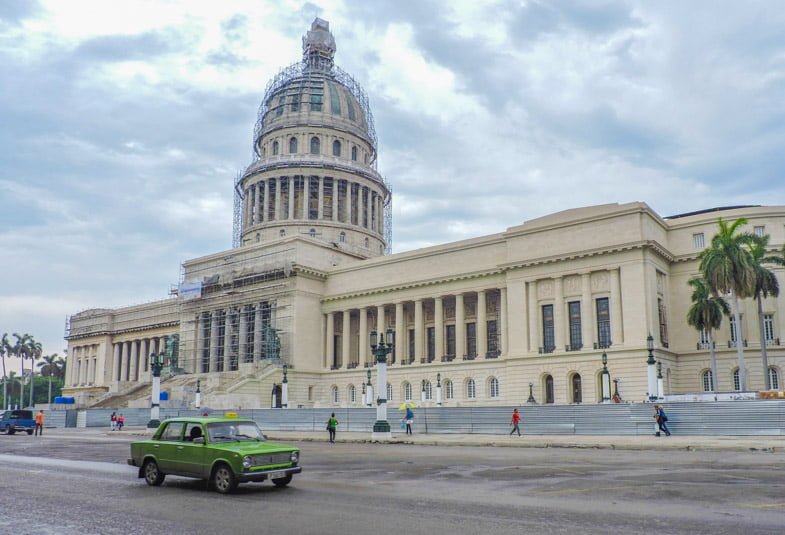
4. $6 Coffee
Coffee can be purchased for around 50 cents – $1 from the wee shop windows dotted around Havana.
However, some shops sell overpriced coffee to gringos.
Please don’t be surprised when a local kindly offers to buy it for you in local currency (CUP) at a fraction of the cost in exchange for a dollar.
If you are particularly gullible this scam will be extended.
Your new friend will now wander through the streets with you sharing friendly local knowledge.
Do expect a bill for a private tour at the end. This happened to a mature couple in Havana.
Unsure about Cuban money? Read our Cuban currency guide.
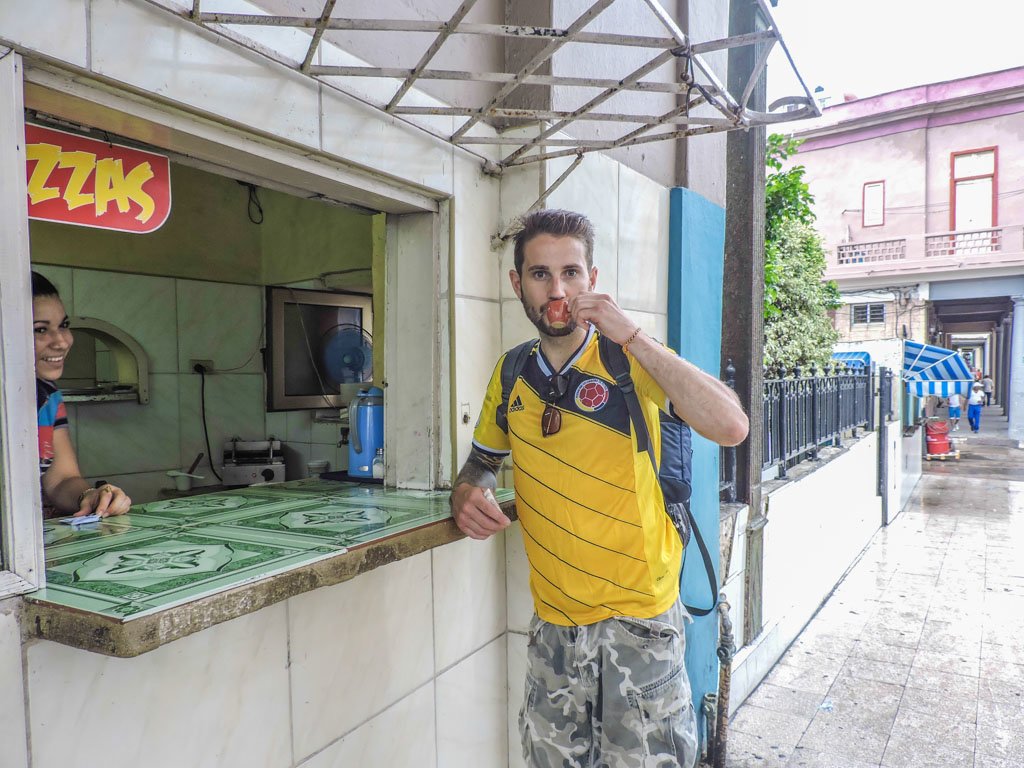
5. Food in Cuba
Food in Cuba is a hot potato topic for tourists. Some meals will be great, others will be OK.
We first tried Ropa Vieja in Trinidad and make it often at home in Scotland.
If staying in a casa you will have to eat out, unless your host offers to cook for you for an additional charge.
Like in many countries, PRs will try to encourage you into their restaurant.
When a PR approaches you, take what is on offer with a pinch of salt.
Once you are seated, the menu might look at a little different and drinks might not be inclusive of the price as promised.
We fell victim to this scam in Caleton (Bay of Pigs). It was a little annoying because my partner is a really fussy eater and since Caleton is tiny, choice was limited.
However, don’t let this put you off visiting the Bay of Pigs if plan to dive. You can read more about diving in Cuba here.
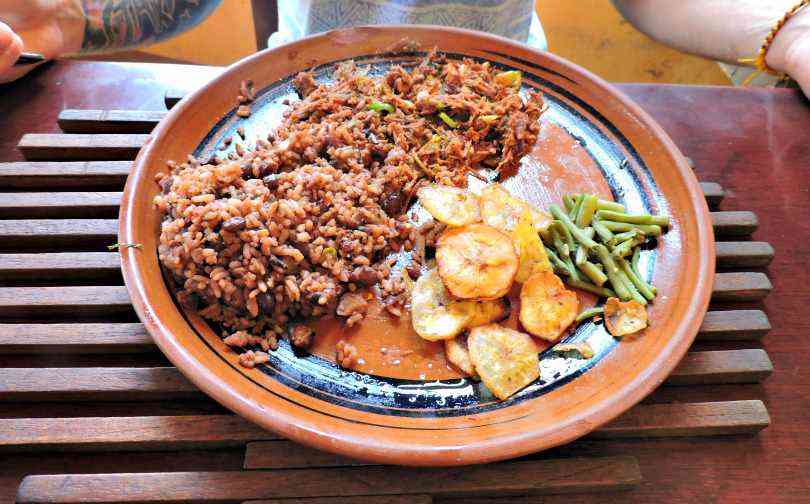
6. Casa Particular Prices
On average, Cuban government wages are $28 per month, some would say this wage is relative to local prices, others would say it’s not.
To bump up wages, many Cubans rent out second houses or extra rooms.
This is all above board. Official casas have a specific sign outside of their homes and they record your details for government records.
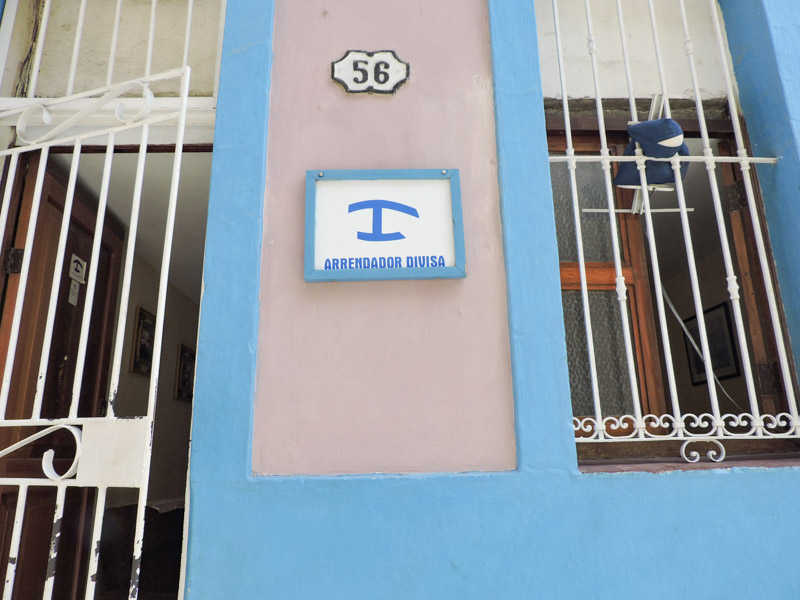
Staying in a casa is part of the Cuban vacation experience.
Guidebooks and websites recommend you budget $10-30 per night.
We never paid more than $10 per person (plus breakfast) after the first casa.
Be cautious of how much you pay for casas, there isn’t always that much difference between the properties.
You can read everything you need to know about casas particulares here.
Should you buy gifts for locals?
Good question and one we get asked often.
We didn’t and were never asked for any.
My good friend, Laura, did feel that there was more of an assumption that tourists would have gifts in the south of the island or possibly because she was part of an organised tour and not travelling independently?
If you do want to bring items, pack items they may actually need such as toiletries or toys for kids.
7. “Lo siento, no tengo cambio”
When paying street traders and some shops with notes, expect there to be little change.
You have two options here.
One, accept being short changed.
Two, listen out for “no tengo cambio” which means, I have no change.
Advise the shop keeper that you will go elsewhere if there is no change.
Learn the language!
We have survival Spanish but struggled, luckily for us we were travelling with a fluent Spanish speaker.
Purchase a phrasebook at the very least.
8. Buses in Cuba
There are two bus companies that travel throughout Cuba, Viazul and Conectando.
Viazul has a website where you can book seats making it more popular with tourists.
The journey times are also available on the site.
I suggest that you take a screenshot of the trips you intend to make because no one ever knows the times of the buses.
The reason for this is unclear.
It could be because regardless of schedules, buses run on ‘Cuba time’ anyway or possibly as casa owners would prefer you stay another night which is what they asked us to do in Caleton near Playa Larga at The Bay of Pigs.
Another reason could be because there are taxi colectivos which do the same route and by selling a ride, commission is made.
Taxi colectivos are shared car rides.
It is very common for tourists to hire collectivos to get between towns in Cuba.
You may also be asked to swap cars during long journeys so don’t be spooked if this happens!
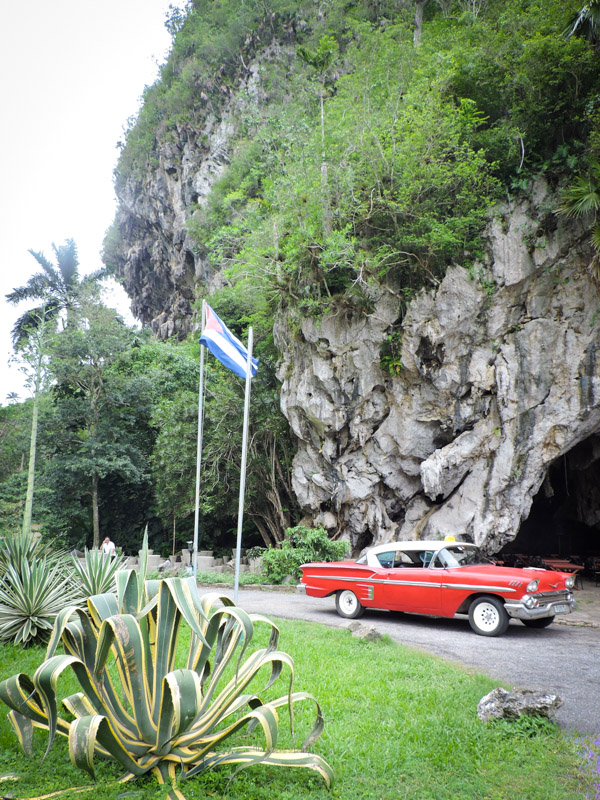
9. Holiday Romance in Cuba
It is not uncommon to see mature Western women with young Cuban men, salsa dancing in the night clubs of Cuba, specifically in Trinidad.
However, if you meet a local who picks you up in a cafe or while sightseeing and the police takes a keen interest in your date, it might be time to consider your options fast.
We met a young Irish high school teacher who set up a date with a waitress of the same age in Trinidad.
He became concerned when the cops were showing her as much interest as he was.
The police understood, only his pride was challenged.
However, in Havana, a huge group of us joined another traveller who was invited by a local to see a cool live band.
The best advice is to have your wits about you and read the situation.
The below image is a bronze sculpture by Cuban artist Roberto Fabelo called Fantastic Voyage.
According to our Havana tour guide, it symbolises all the young Cuban women who have sought another life with foreign men.
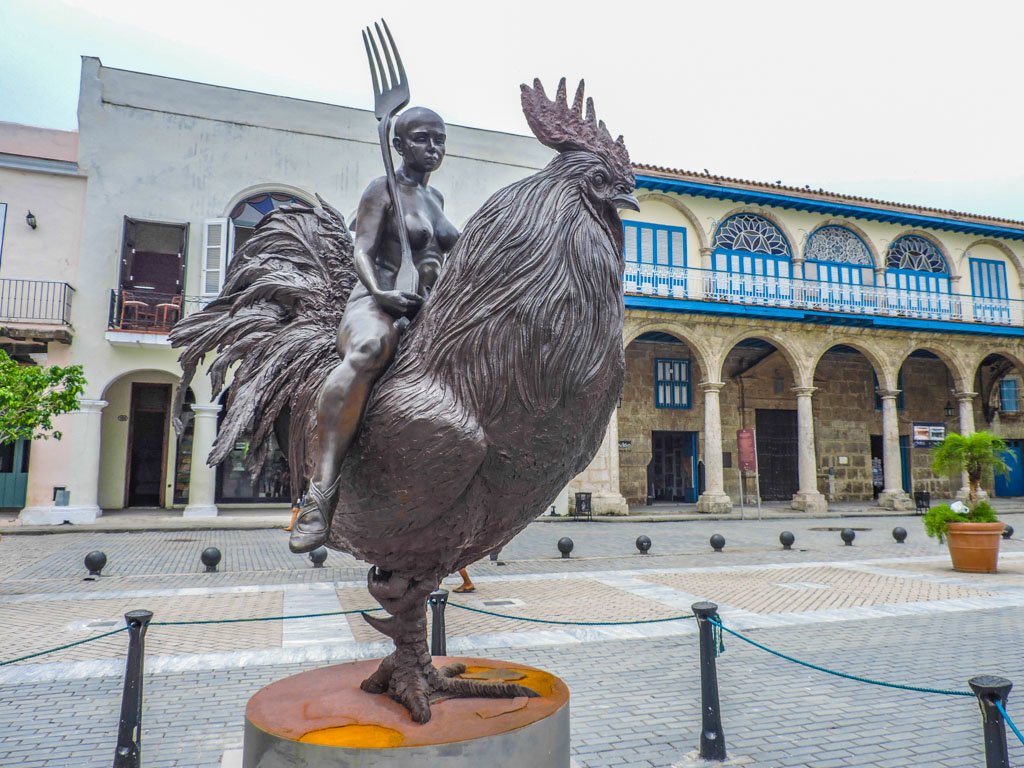
10. Shop Shut!
This scam is not unique to Cuba but we did experience a good attempt to get us into a bar and away from The Revolution Museum.
An older couple told us that it was their anniversary! Congratulations, we rejoiced.
After a bit of chat, they asked where we were going… Alas, the museum is closed today but you should check out this bar!
We said our goodbyes and turned a corner to an open museum. They get a commission when you step through the bar door.
This is a common scam in many countries, especially with taxi drivers advising you that hotels/hostels have closed down.
Final Words
Now we are not saying Havana is ‘scam city’ and I’ve definitely fell for worse during my travels, Istanbul note scam I’m looking at you!
Be equipped, avoid these tourist scams in Cuba and you’ll have a fun trip. Even if you do fall for any of them, it’s a story to remember.
Going to Cuba?
Pin to your Cuba Pinterest board!
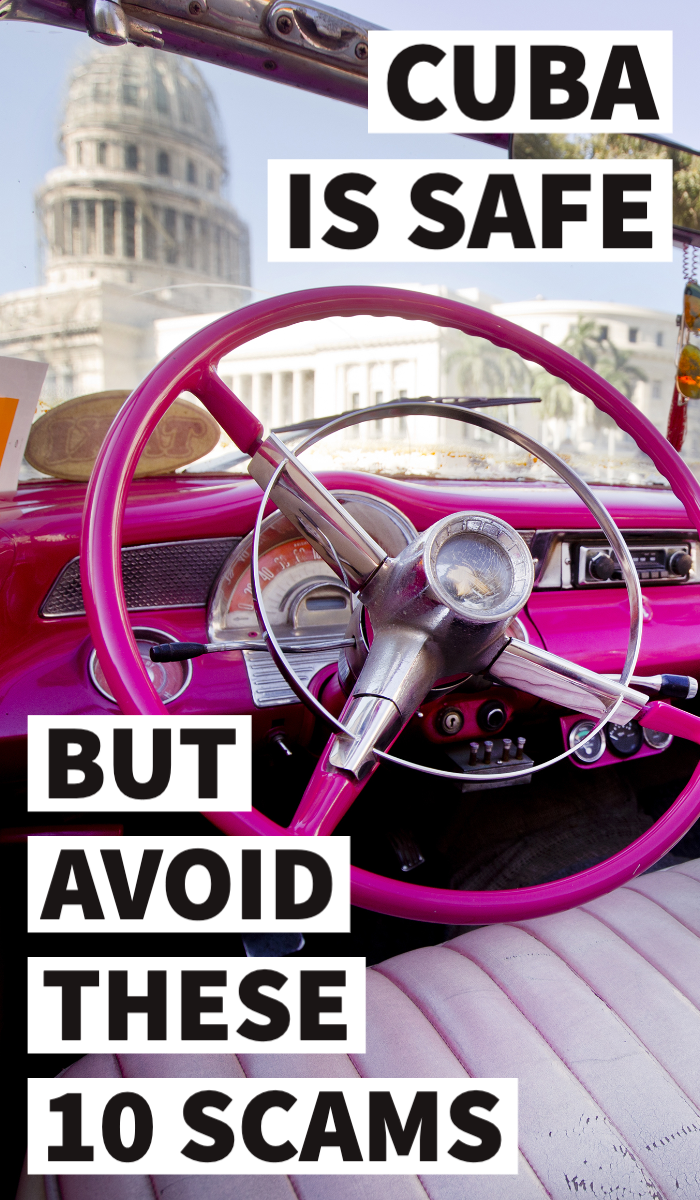
Any scams to add? Tell us in the comments below

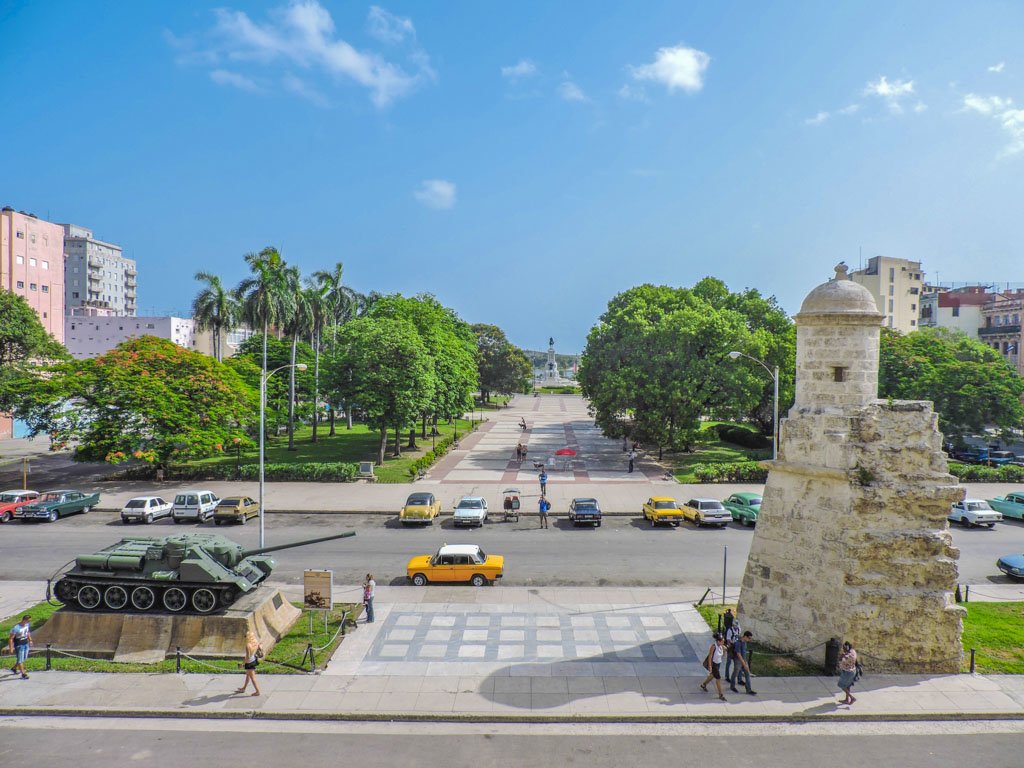
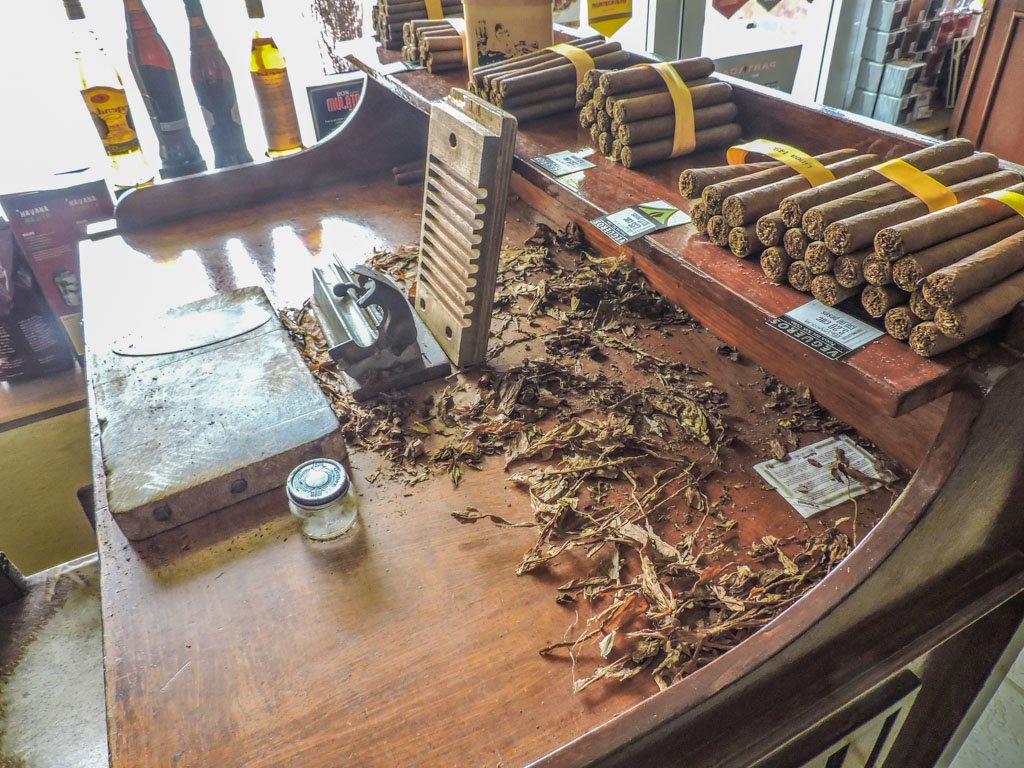
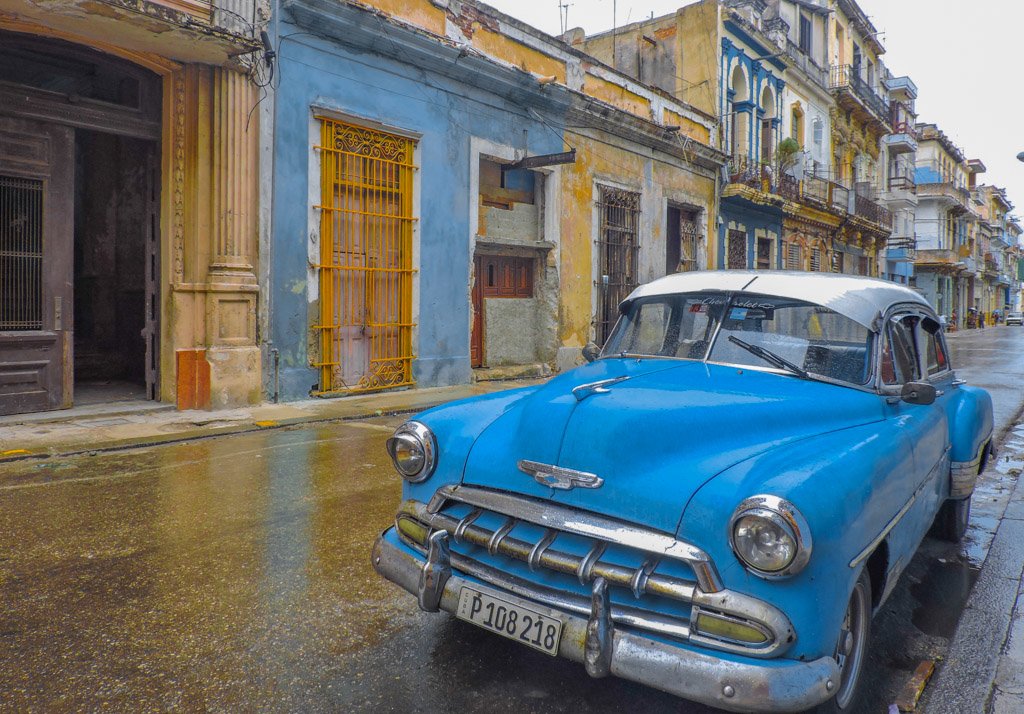
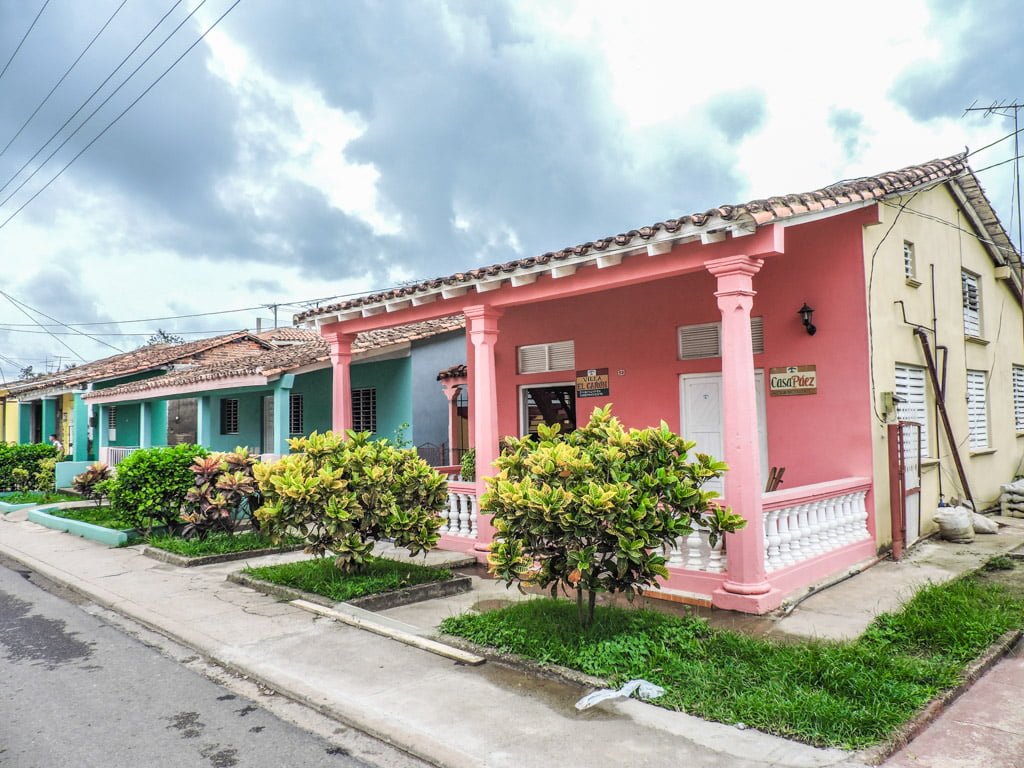
Scams in Paladar: I recommend you to take meals on paladars, foods are very good, too big and cheap; but some paladars have serveral list of prices, they will offer you a multiplied price depending on how the customer is. They traid to scam me with this system on Havana and also in Santiago. Rememeber: a nice diner will cost less than 12 CUC
Always appreciate this advice for our readers Angel. Thanks for reading!
I just came back from Cuba and I have exactly experienced the same. I felt bad the first days like having bad conscience for not feeling sorry for people that scam me and rob me openly….because I come from Europe and supposedly better off? Well no, this lasted only two days. Everyday I had to engage in discussions in order to get the right bill for everything we shopped and still this has been more expensive than holidays in NY?!
Cubans who deal with tourists have money, what they don’t have is shops to spend it on. Yes, their system has become decadent but at least they don’t have a group of policemen banging on the door to throw them out of their homes because they couldn’t pay the rent or bank loan.
Yes, I enjoyed Cuba’s nature, no I didn’t enjoy Cubans sourness because I demand a fair price.
You make a very good point about the lack of shops for locals to spend money in! It certainly wasn’t a smooth three weeks for us either. Of course the beaches are postcard perfect and Havana is a lot of fun but it was the toughest country we travelled around in the whole 17 month trip, and that includes South, Central America and the Balkans.
We have plannend a trip to Cuba next janary 2017, I think these tips are good, but could be scary to people to go. We’ll see, have an open mind, people just try to get some extra money.
At least if there is no hard criminality, these scams are part of every country with lots of tourists, even here in Holland, say Amsterdam or less in Rotterdam.
I haven’t heard from anyone else that they found the article scary – it was not my intention! I just like to show all sides of travel, the palm trees and the problems. It would be unfair of me not to be truthful. Sure, many of these scams are used throughout the world to get a quick buck, I’ve not made any of them up – this either happened to us or fellow travellers during our three weeks in Cuba! I’m sure you’ll have a blast, what’s your itinerary?
Arriving in Havana, stay 3 nights, then of to finales, Soroa, cienfugos, Trinidad and end in varadero. All stays are casas, and all transfers by oldtimers, we booked all of this from Holland with Better places, they have specialized people for Cuba, together with them we planned the trip. And for a reasonable price.
Sounds excellent. If you are into cigars, buy in Vinales at the official shop – cheaper than Havana. There’s nowhere quite like Cuba! Check out our other posts and get back to me with any questions!
Yes, I like a good cigar, will take your advice.
Since I’m a fan of the fifties I most certainly will have fun, hope I will have the change to actually drive an oldtimer, going to ask anyway.
Since internet is not quite well all images and videos we plan to shoot will be placed after the trip on Facebook.
We can’t wait to go, just a little over six months.
Ah that’ll fly in! Yes, just save your social media updates for post trip – enjoy the time you have there. So much to do you will forget about Facebook pretty quickly!
I am a Canadian who traveled to Cuba 9 times now. I love the country and the people. If you’re a younger person I would suggest that you visit Varadero first for the beaches, parties and things to do! Go all inclusive! 😉 From Varadero you can day trip into Havana. Havana is a beautiful place full of history trapped in time from past to present. The only thing I really did not like about Havana was the con artist beggars. Be careful and don’t fall for those scams. A popular one is… “I need money to buy food for my baby”! … only to learn that she has a different baby every day! I found the children find it easy to beg as well! I did take things for the children that were In school tho. I love going to Holguin and I have made a lot Cuban friends there. Truly sincere people that welcome you into their homes and don’t ask for anything even when you try to give them some things. I have been invited to join some friends from Montreal that are joing to Havana in November for a week. I kinda know what expect. I plan on renting a casa with a kitchen for the week in “Chinatown Havana”. I like to cook and since I have issues with shrimp and pork, I think this will be best! There are many affordable places to stay in Havana and I don’t mind paying to stay in someone house that can help me and help them out as well. The average wage for a Cuban is about $30 per month. I understand why they beg, but I tell them that we work very hard for these vacations and we do not spend time with family like they do! The Cubans are very family oriented and when you spend time with them you will see that! I hope his helps you out and I hope you do make that visit to Cuba before they become “Americanized”! Cuba is a beautiful place to visit! FYI, I bring my own ketchup, mustard and spices because theirs are not to my liking! 😉 Any questions, you can emai me!
Thanks for reading and sharing your experience. I’ve actually covered lots of your point in other posts, as well as our personal experience. It’s here if you’d like to read more. Gracias!
Thanks for sharing your experience! How can I email you?
Check out our contact us page.
Cuba was awesome, returned Sunday from Varadeiro and therefore a fresh experience. My son works in Canada but we are South Africans, so….. just to get through customs was a challenge on its own. The scams are a reality, we were fortunate to have a Cuban friend as our guide and the scamsters sincerely apologised when she started speaking Spanish. Tip: I found that the Cigars and rum at the duty free shop at the airport were cheaper than the shops and no security hassles.
Excellent tip, thank you! I’m glad you had a fun and stress free trip!
First off all of this information is CRAP! I am Cuban born and raise there…those scams you’re talking about in reality is just people trying to make a living, trying to survive. Come on! If you know they’re only making $28 per month have you stopped to think how can they get the food in order to serve you breakfast you douche bag! Just pay them $30 a night don’t be cheap! And about the bus time they really don’t know smart ass! You have no idea how it is to live there so don’t write articles when you don’t know what the hell youre talking about you ignorant!
Thanks for commenting Elice, always nice to hear a local’s point of view. Where are you in the world today? We never actually came across a $30 casa room, just word of mouth from fellow travellers. Like we said here, we did pay for breakfast every day, on top of the room charge. Of course those casas are second or third incomes for the owners. I don’t doubt that there is inequality in Cuba, like there is in every country. Of course we will continue to write about our experiences in the countries we visit, that’s the point in travel blogging! Obviously you’ve read all ten of articles on Cuba to get the overall picture of our three weeks spent travelling around as part of our eighteen month trip.
Off there next month. Really looking forward to it. Thanks for advice.
Ah so good to hear! It really is a special / strange country. We have lots more on money advice, WiFi, casas, etc and locations if you are interested!